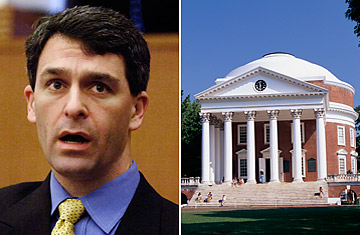
Virginia Attorney General Ken Cuccinelli Jr., left, and the University of Virginia
It's been a turbulent few weeks for gay rights, the Virginia attorney general and college students across the Old Dominion.
First, Republican Governor Bob McDonnell issued an executive order last month that "specifically prohibits discrimination on the basis of race, sex, color, national origin, religion, age, political affiliation, or against otherwise qualified persons with disabilities." Left off the list, notably, was a mention of sexual orientation.
Then five days ago, Republican Attorney General Ken Cuccinelli Jr. sent a letter to public colleges and universities advising them that state law prohibits "a college or university from including 'sexual orientation,' gender identity,' 'gender expression' ... as a protected class within it's non-discrimination policy."
Cuccinelli's notice sparked a remarkable outcry of gay-rights supporters on college campuses across the state. Administrators, professors and students organized panel discussions and rallies — both in person and online — complaining that Cuccinelli's edit would lead to a rise in hate crimes and a drop in diversity in admitting students and hiring faculty. "His radical actions are putting Virginia at risk of losing both top students and faculty, and discouraging prospective ones," says Jon Blair, CEO of the gay-rights group Equality Virginia.
Following the outcry, on Wednesday afternoon, McDonnell issued an executive directive that clarified his earlier executive order, contradicting Cuccinelli's previous statement and specifically prohibiting discrimination "based on factors such as one's sexual orientation."
The attorney general's response was noncommittal: "I applaud Governor McDonnell for the tone he is setting for the Commonwealth of Virginia. I will remain in contact with the Governor and continue to work with him on issues important to Virginians." Cuccinelli, in his earlier directive, had acted on his own accord, building on the governor's previous executive order, but went too far, says a state political analyst who preferred to remain anonymous. The governor's clarification amounted to "a public spanking of Cuccinelli," says the analyst.
The back and forth came after more than 1,500 students and supporters rallied Wednesday at Virginia Commonwealth University to protest Cuccinelli's letter. Waving rainbow flags, chanting "Down With Hate" and wielding signs that read "Jesus Had 2 Dads, Too" and "Homophobia Is A Sin," the animated band assembled near the student union, before 200 later broke away and marched down a main road within blocks of the Virginia State Capitol.
Thousands organized on Facebook to discuss the rulings. One Facebook group, "We Don't Want Discrimination In Our State Universities and Colleges," has more than 5,000 members. Frequent message blasts urged people to phone Cuccinelli's office, send e-mails and write on his Facebook wall. "It's just a huge slap in the face to treat schools that poorly, and lesbians and gays in general," says Seth Kaye, a sophomore computer science major and president of the Queer and Allied Activism group at the University of Virginia. "We are being singled out. People are upset. It's really frustrating." Specific wording protecting gays, he contends, is important to help remind the UVA community to exercise better judgment. "Virginia is supposed to be for lovers!" he exclaimed, referencing an ad campaign by the Virginia Tourism Corporation.
In an interview with TIME, Cuccinelli says his letter was meant to "issue blanket advice" to high-level college administrators, something he felt was needed after he received several inquiries from schools. The letter reaffirmed that "Virginia's public universities are, at all times, subject to the control of the General Assembly," and because wording adopted by General Assembly policies do not specifically name "sexual orientation" as a class protected in non-discrimination, "any college or university that has done so has acted without proper authority."
The letter was seen as a blow to the independence of the state's education institutions, which normally have "a great deal of autonomy," says Kirsten Nelson, spokeswoman for the State Council of Higher Education for Virginia. "Changes must be made by the General Assembly. Without changes, historically it has been assumed that it is the will of the General Assembly that the institutions retain broad control of their governance." The Council will discuss this issue at their regularly planned meeting next week.
